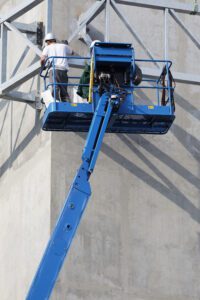Contents
Show
Book LOLER Thorough Examination
Need your lifting equipment examined in line with LOLER98 regulations? Get a quote today to ensure you remain compliant.

Need your lifting equipment examined in line with LOLER98 regulations? Get a quote today to ensure you remain compliant.
Stay compliant. Stay safe. Book your examination today with SEIS – your trusted independent inspection & testing company in Caistor.
Thorough examinations in line with LOLER98 are legally required, periodic examinations, for all lifting equipment. The aim of these examinations is to ensure equipment and workplace safety, and overall compliance in line with UK regulations. In turn protecting your workforce from potential hazards, and you from non compliance.
Book LOLER Inspection
History of Caistor
Caistor is a small, historic town located on the edge of the Lincolnshire Wolds, an Area of Outstanding Natural Beauty. Its history stretches back to Roman times, when it was established as a fortified settlement known as Caistor Roman Town. Significant remnants of Roman occupation can still be seen today, most notably parts of the original Roman walls, which are among the best-preserved examples in the region. The town’s name is derived from the Latin word castrum, meaning fort, reflecting its origins as a Roman military outpost.
Following the Roman period, Caistor continued to be an important local centre through the Anglo-Saxon and medieval eras. It developed as a market town, with agriculture forming the backbone of its economy. The medieval Church of St. Peter and St. Paul, located within the remains of the Roman walls, is a prominent feature and illustrates the town’s long ecclesiastical history. In the 19th century, Caistor served as a rural administrative and commercial hub, with the establishment of schools, shops, and services catering to the wider agricultural area. Today, Caistor retains much of its historical charm, with Georgian and Victorian architecture lining its narrow streets, and its heritage is a key part of its modern identity.
Industry in Caistor and the Surrounding Area
Caistor’s economy has traditionally been centred around agriculture and rural trade, reflecting its position on the edge of the fertile Lincolnshire Wolds. Historically, it served as a service town for the surrounding farming communities, providing access to markets, supplies, and local trades. While large-scale industry has never been a major feature within Caistor itself, its agricultural roots remain strong. Arable farming, livestock, and food production continue to be important in the surrounding countryside, with farms producing cereals, root crops, and meat for both local and national markets.
In more recent decades, light industry and small-scale manufacturing have developed around Caistor, particularly on the town’s industrial estates such as Caistor Industrial Estate and North Kelsey Road Industrial Estate. These sites host a range of businesses including metalworking, construction services, agricultural engineering, packaging, and logistics. The presence of these smaller enterprises has provided local employment opportunities while preserving the town’s largely rural character.
Caistor also benefits from its location near key transport routes, offering relatively easy access to larger economic centres such as Grimsby, Immingham, and Lincoln. This makes it viable for residents to commute to work in industries such as food processing, logistics, and renewable energy—sectors that are growing rapidly across North and North East Lincolnshire. In addition, the town has a modest but growing tourism and hospitality sector, supported by its Roman and Georgian heritage, proximity to the Lincolnshire Wolds, and increasing interest in rural tourism.
Overall, Caistor’s industrial profile is modest but evolving, with a mix of traditional agricultural activity and modern small business development sustaining its local economy.
Caistor is surrounded by towns and villages whose development has traditionally been shaped by agriculture, quarrying, and small-scale rural industry. Nearby places such as Market Rasen, Brigg, and Kirton in Lindsey grew as market centres serving the farming communities of the Lincolnshire Wolds. The area’s chalk and limestone landscape supported arable farming and sheep rearing, which formed the backbone of the local economy for centuries.
Smaller villages including Nettleton, Grasby, and Croxby relied mainly on agriculture but also developed supporting industries such as milling, malting, and lime burning. Quarrying was particularly important in parts of the Wolds, providing stone for building and road construction. Local craftsmen, blacksmiths, and agricultural engineers played a vital role in supporting farming life across the villages.
In more recent times, traditional industries have modernised rather than disappeared. Farming remains important, alongside food production, rural businesses, and tourism linked to the Lincolnshire Wolds Area of Outstanding Natural Beauty. While large-scale industry is limited, the surrounding towns and villages continue to reflect Caistor’s strong agricultural heritage and its role as a rural service centre.
LOLER regulations place strict duties on business owners and equipment operators. Any business in Caistor that owns or operates lifting equipment must ensure that:
Lifting equipment is safe to use.
Examinations are carried out at regular, legally required intervals.
Inspections are conducted by a competent and impartial person.
Failure to comply can lead to heavy fines, prosecution, and serious safety risks.
At SEIS, we know that every business in Caistor – whether in heavy industry, agriculture, healthcare, education, or automotive—depends on reliable, safe equipment. Regular LOLER inspections & LOLER testing reduces the risk of accidents, protect your workforce, and ensure smooth day-to-day operations. Compliance not only keeps you legal, but also demonstrates a strong commitment to employee safety.
Book LOLER InspectionA thorough examination under LOLER is a detailed and legally required inspection of lifting equipment. Unlike simple checks or maintenance tasks, a LOLER examination must be performed by an impartial, competent person and results in an official Report of Thorough Examination.
How often your lifting equipment in Caistor needs to be inspected & tested depends on its type and use:
Every 6 months – For lifting equipment used to lift persons (e.g., passenger lifts, wheelchair lifts, patient hoists), or lifting accessories and attachments.
Every 12 months – For other lifting equipment (e.g., cranes, forklifts, goods lifts).
After significant changes or repairs – Equipment must be inspected immediately if it has been modified, damaged, or relocated.
LOLER requires inspections to be carried out by a competent and independent person—not by the equipment supplier or operator. At SEIS, we meet these exact criteria. Our inspections are impartial, unbiased, and always in line with UK regulations.
Book LOLER InspectionBusinesses in Caistor use a vast range of lifting equipment, and at SEIS we provide LOLER inspections across them all.
Passenger lifts
Goods lifts
Vehicle lifts
Wheelchair and platform lifts
Overhead travelling cranes
Mobile cranes
Forklift trucks
Lifting tackle and accessories
Slings (chains, ropes, webbing)
Shackles and hooks
Lifting beams and frames
Chain blocks and lever hoists
No matter the type of equipment on your site, SEIS ensures every examination is completed thoroughly, with full reports for your compliance records.
Book LOLER Inspection
A thorough examination on a fork lift truck or reach truck ensures all safety critical components are identified in line with SAFed guidance MLCC 07, and the plant is examined in line with SAFed guidance LG 4. This includes a full structural integrity assessment, referencing specific guidances such as BS ISO 5057:2022 for fork arm inspections, and testing of any safety systems present.

A thorough examination on a crane (all variants) ensures all safety critical components are identified in line with SAFed guidance MLCC 07, and the plant is thoroughly examined. This includes a full structural integrity assessment, referencing specific guidances such as BS ISO 4309:2017 for rejection criteria of the steel wire hoisting rope, and testing of any safety systems present.

A thorough examination on a motor vehicle lifting table (all variants) ensures all safety critical components are identified in line with SAFed guidance MLCC 07, and consideration is given to SAFed guidance MLCC 13 whilst the plant is thoroughly examined. This includes a full structural integrity assessment, referencing specific guidances such as BS ISO 4309:2017 for rejection criteria of the steel wire hoisting rope, any manufacturers guidance for inspection of load nuts and safety nuts, and testing of any safety systems present

A thorough examination on chain hoists, lifting tackle and lifting attachments (all variants) ensures all safety critical components are identified in line with SAFed guidance MLCC 07, and the plant is thoroughly examined. This includes a full structural integrity assessment, referencing specific guidances such as BS ISO 4309:2017 for rejection criteria of the steel wire hoisting rope, PM28 for non-integrated work platforms, and testing of any safety systems present.

A thorough examination on Passnger/Goods lift (all variants) ensures all safety critical components are identified in line with SAFed guidance MLCC 07, and consideration to SAFed guidance LG 01 is applied whilst the plant is thoroughly examined. This includes a full structural integrity assessment, referencing specific guidances such as SAFed LG01 for rejection criteria of the suspension ropes, any further manufacturers specific guidance for inspection and rejection criteria of suspension ropes, and testing of any safety systems present.

A thorough examination on Platform lifts (all variants) ensures all safety critical components are identified in line with SAFed guidance MLCC 07, and consideration to SAFed guidance LG 01 is applied whilst the plant is thoroughly examined. This includes a full structural integrity assessment, referencing specific guidances such as SAFed LG01 for rejection criteria of the suspension ropes, any further manufacturers specific guidance for inspection and rejection criteria of suspension ropes, manufacturers criteria on load nut rejection, and testing of any safety systems present.

A thorough examination on a vacuum lifting machine (all variants) ensures all safety critical components are identified in line with SAFed guidance MLCC 07. This includes a full structural integrity assessment, referencing specific manufacturers guidances, and testing of any safety systems present.

A thorough examination on a Mobile Elevating Work Platform (MEWP) ensures all safety critical components are identified in line with SAFed guidance MLCC 07. This includes a full structural integrity assessment, referencing specific manufacturers guidances, and testing of any safety systems present.

A thorough examination on a fork lift truck ensures all safety critical components are identified in line with SAFed guidance MLCC 07. This includes a full structural integrity assessment, referencing specific guidances such as BS ISO 5057:2022 for fork arm inspections, and testing of any safety systems present.

A thorough examination on a fork lift truck ensures all safety critical components are identified in line with SAFed guidance MLCC 07. This includes a full structural integrity assessment, referencing specific manufacturers guidances, and testing of any safety systems present.

A thorough examination on a lorry mounted crane/ HIAB (all variants) ensures all safety critical components are identified in line with SAFed guidance MLCC 07, and consideration is given to BS 7121-2-4:2013 whilst the plant is thoroughly examined. This includes a full structural integrity assessment, referencing specific guidances such as BS ISO 4309:2017 for rejection criteria of the steel wire hoisting rope, and testing of any safety systems present (RCI & RCC).

A thorough examination on a personnel hoist, stair lift/ wheel chair stair lift and personnel sling (all variants) ensures all safety critical components are identified in line with SAFed guidance MLCC 07, and the plant is thoroughly examined.This includes a full structural integrity assessment, referencing specific manufacturers guidances, and testing of any safety systems present.

A thorough examination on a fork lift truck or reach truck ensures all safety critical components are identified in line with SAFed guidance MLCC 07, and the plant is examined in line with SAFed guidance LG 4. This includes a full structural integrity assessment, referencing specific guidances such as BS ISO 5057:2022 for fork arm inspections, and testing of any safety systems present.

A thorough examination on a fork lift truck or reach truck ensures all safety critical components are identified in line with SAFed guidance MLCC 07. This includes a full structural integrity assessment, referencing specific manufacturers guidances regarding load testing, referencing of MLCC01 for load chain elongation (if fitted) and testing of any safety systems present.
SEIS is proud to support Caistor businesses with impartial, expert inspections. We understand the local industries, from agriculture to food production, and we tailor our service to meet your needs.
As an independent inspection provider, we do not sell or repair lifting equipment. This means you can trust our assessments to be impartial, unbiased, and fully in line with LOLER regulations.
Our team of qualified surveyors have years of hands-on experience across multiple industries. They know exactly what to look for and how to ensure your business remains compliant without unnecessary disruption.
We understand that downtime costs money. That’s why we work around your production schedule, conducting inspections efficiently and professionally so your operations continue smoothly.
Book LOLER InspectionWe make LOLER inspections & testing straightforward and hassle-free for local businesses.
Simply get in touch with our team, and we’ll arrange a time that works for you.
Our engineer surveyors visit your site and carry out thorough examinations with minimal disruption.
After each inspection, you’ll receive a clear, detailed report highlighting any defects and recommended actions.
We’ll manage your inspection schedule, reminding you before your next due date. Plus, you’ll have access to our online reporting portal, so your certificates are always at your fingertips.
Book LOLER InspectionChoosing the right inspection provider makes all the difference. Here’s why Caistor businesses trust SEIS:
From the agriculture, food manufacturing to schools, and garages, we understand the unique challenges businesses here face.
We provide inspections for:
Heavy industry
Education
Healthcare
Automotive
We pride ourselves on safety, compliance, and customer service—always putting your needs first.
Caistor is a small market town in Lincolnshire, England, located on the edge of the Lincolnshire Wolds.
The town has Roman origins and was once the site of the Roman settlement known as Caistor-by-Lincoln.
Remains of Roman walls can still be seen in and around the town.
Caistor developed historically as a local market centre for surrounding farming communities.
The Lincolnshire Wolds around Caistor are designated an Area of Outstanding Natural Beauty.
Agriculture has long been the main influence on the town’s economy and development.
Caistor Grammar School has a long history and is one of the town’s best-known institutions.
The town is located close to larger centres such as Market Rasen and Grimsby.
Caistor retains a number of historic buildings reflecting its market-town past.
Today, Caistor has a small but varied economy including local services, agriculture-related businesses, and tourism.
Booking with SEIS is quick and easy:
✅ Call our friendly team
✅ Fill in our online booking form
✅ Get your inspection arranged around your schedule
We’ll handle the rest, ensuring your equipment is inspected thoroughly, your compliance is up to date, and your workforce is kept safe.
A LOLER inspection, or thorough examination, is a legally required check of lifting equipment to ensure it is safe, compliant, and fit for use.
Inspections are required:
Only a competent and impartial person can perform LOLER inspections. At SEIS, our independent surveyors meet these requirements.
LOLER applies to:
and all lifting accessories used at work.
Yes. Whether you run a large factory or a small garage, any business operating lifting equipment must comply with LOLER.
Non-compliance can lead to fines, legal penalties, equipment downtime, and serious safety risks for staff.
No. SEIS works around your schedule to complete inspections efficiently, minimising downtime and disruption.
You’ll get a digital Report of Thorough Examination by email and access via our secure online portal.
Yes. We manage your compliance schedule and send reminders before your equipment is due for inspection.
Yes. Alongside Caistor, we also serve clients across the county and nationally, across the whole of the UK.